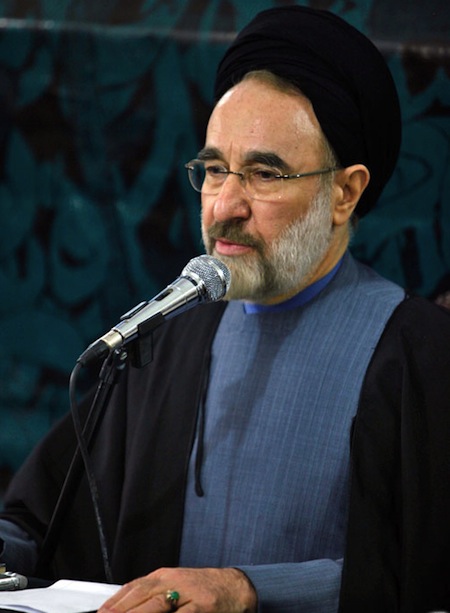Despite the fact that many U.S. commentators have written off Iran’s upcoming presidential election as somewhat of a bore with the rejection of the candidacy of former president Hashemi Rafsanjani, there’s still plenty of intrigue.![]()
If the first step of the Iranian presidential election was the ‘pre-qualification’ phase, and we’re currently in the second phase, the third and final phase is likely to be the whittling down of the current eight remaining candidates to just one or two major conservative frontrunners (perhaps Iran’s nuclear negotiator Saeed Jalili) and one moderate candidate.
Rafsanjani’s exit from the campaign doesn’t mean that reformists don’t have options, and one of the key questions is whether reformists (and moderates like Rafsanjani) will unite behind a single candidate and, if so, who they will support and how strongly they will support him.
No one is more central to that question that another former Iranian president, Mohammed Khatami, who succeeded Rafsanjani in 1997 as a surprising dark-horse presidential candidate.
Khatami is by far the most liberal of the four major presidents of Iran’s Islamic Republic — the conservative Ali Khamenei has been the country’s Supreme Leader since 1989, Rafsanjani has always been a middle-of-the-road, moderate conservative in Iranian politics, and Mahmoud Ahmadinejad has been a stridently conservative president, even if he’s clashed with the Supreme Leader and even though he’s been more populist than his predecessors.
Although Ahmadinejad has, in some ways, proven more successful in clawing more power for the presidency, Khatami wasn’t wholly ineffective as president. He oversaw a period of looser restrictions on freedoms in Iran, deeper engagement among Iranian civil society groups and, while U.S.-Iranian relations were not necessarily good during the Khatami era, he promoted what he called a ‘dialogue among civilizations’ between the Islamic Republic and the West.
Khatami, who openly supported Rafsanjani’s now-aborted presidential campaign, has been coy about his favorite among the eight remaining candidates. For his part, Rafsanjani has also been quiet.
But there are essentially just two candidates that either Khatami or Rafsanjani are likely to support: Mohammed Reza Aref and Hassan Rowhani.
Aref, who served as energy minister in Khatami’s first term and as his vice president in Khatami’s second term, is more reformist than Rowhani, though he doesn’t have the wide support and charisma that Khatami himself would have brought to the campaign — Khatami, although he declined to run both now and in 2009, would have been by far the strongest reformist candidate in either election. If Khatami backs Aref, and he brings Rafsanjani’s support to Aref’s campaign, it would clearly make Aref the moderate frontrunner in the race. If Khatami backs Aref and if Rafsanjani remains silent or openly supports Rowhani, moderates and reformists seem destined to split their votes, giving them no chance at winning the presidency.
Rowhani, who is more moderate, has very close ties to Rafsanjani, with whom he worked closely in the 1980s, and he served as the deputy speaker of the Islamic Consultative Assembly (Majles), the Iranian parliament, in the 1990s. From 1989 to 2005, he was the secretary of the Supreme National Security Council, where he served as Iran’s chief nuclear negotiator — both are roles that Jalili now serves. If Khatami supports Rowhani, it will be a powerful indicator that he considers Rowhani trustworthy enough for reformists, which would make Rowhani the moderate frontrunner.
When the Guardian Council last week announced the eight final candidates, it was tempting to wonder if they approved both Aref and Rowhani in order to drive a wedge between Rafsanjani and Khatami — the obvious inference is that Khatami prefers Aref and that Rafsanjani prefers Rowhani.
With such a short campaign, each day is critical. So it’s telling that ten days after the Guardian Council’s announcement, neither Khatami nor Rafsanjani have publicly tipped their hand.
There’s some evidence to suggest that Rowhani is trying to win over the reformist camp — he released the video yesterday of a remarkable clip on YouTube (you can watch here with English subtitles) from three weeks ago indicating that it’s time for Mousavi and Karroubi to be released from house arrest and that other ‘Green movement’ protestors should be released from detention. He also stridently criticized Ahmadinejad and defended his more conciliatory record as Iran’s nuclear negotiator in a fiery interview earlier this week.
But Aref yesterday became the first candidate to mention Mousavi on the air (it’s been essentially forbidden to mention his name on Iranian television since 2010). Khatami was also quick to deny reports Sunday that he had privately called on Aref to drop out of the campaign in favor of Rowhani, noting that he would announce his view on his own website.
Reading between the lines, it seems pretty clear that Aref and Rowhani are both pushing the envelope to appeal to reformist voters without going so far as to get themselves in serious trouble with Khamenei and the Guardian Council, and it also seems clear that Rafsanjani and Khatami are weighing their options very carefully. Given that 2009 runner-up Mir-Hossain Mousavi and reformist Mehdi Karroubi remain under house arrest, it’s unlikely that they will make any public endorsement, though they might privately influence the direction in which Khatami and other reformists turn. One prominent jailed reformist has simply called on supporters to boycott the election.
So all eyes are on Khatami in particular. If Khatami ultimately backs neither candidate, it could be a sign that he doesn’t think either Rowhani or Aref can win or will be allowed to win, and that could depress turnout among both moderate and reformist voters. That alternative would spare Khatami from making a difficult choice between a candidate who, despite clear ties to Khatami’s administration, has relatively weak popular support (Aref) or a candidate with less than robust reformist credentials (Rowhani).

5 thoughts on “What will Mohammed Khatami do?”